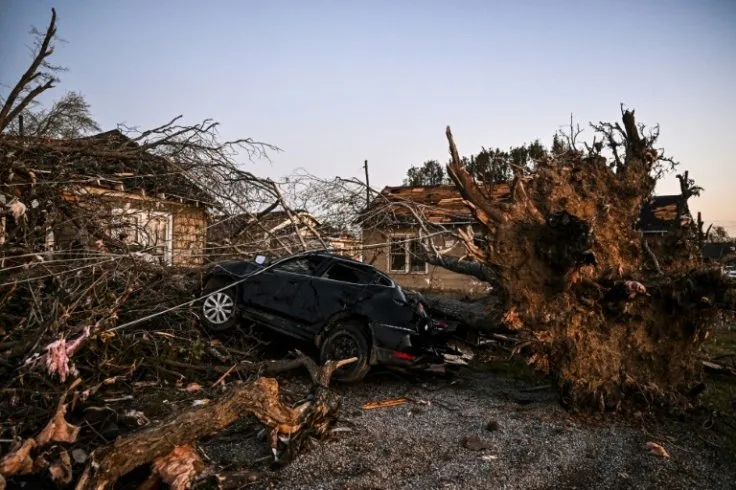Outside, houses are torn open and trees lie with their roots in the air. Inside, stretchers are lined up in front of tables overflowing with food.
In Rolling Fork, Mississippi, where a tornado caused chaos and death, volunteers are pouring in from surrounding towns to help.
The American Red Cross moved into a National Guard building less than 24 hours after the tornado struck Friday night, killing at least 25 people in the community of 2,000.
An ambulance is parked at the entrance of a room being used as an infirmary and, through the back door, boxes full of cereal bars and baby diapers keep arriving.
“We’re trying to give people a place to stay overnight with food and medical support so they can just have a place to lay their heads, because they’ve lost everything,” said John Brown, a Red Cross official for Alabama and Mississippi.
The city is “like a war zone,” he said. “It looks like a bomb went off.”
Whether or not residents choose to stay in the town center, they will at least have access to information and food and regain some strength, Brown said.
Anna Krisuta, 43, and her 16-year-old son Alvaro Llecha sit in the shelter, one on a stretcher, the other on a chair, electric blue energy drinks in front of them.
Their house is “in pieces,” Anna Krisuta says, putting on a brave smile.
Both pull out their cell phones to show the extent of the damage, captured on video.
The pair are not sure whether they will spend the night at the center. Maybe they’d prefer to sleep in the car, Alvaro said, giving his mother a hesitant look.
The teenager said he survived only by hiding in the bathroom, which he considered was the safest room in their house.
“I thought I was going to die,” he said, recounting the strong wind “rushing in through the bottom of the door.”
Lauren Hoda travelled 70 miles (110 kilometres) from Vicksburg to Rolling Fork to volunteer.
She described the mixture of sadness, grief and anger she feels at the “injustice” inflicted on the residents.
“When I woke up this morning, I wanted to cry for the people of this town because I don’t think they had much time before (the tornado) came. There were people eating in restaurants, families in bed,” said the 28-year-old, who also experienced Hurricane Katrina in 2005.
She spent her Saturday night at Rolling Fork bringing donations from collection points: water, food, canned goods, diapers, wipes, medicine, deodorant, and toothpaste.
Jon Gebhardt, an assistant professor of military science at the University of Mississippi, travelled three hours to Rolling Fork, arriving in the middle of the night to help set up the center.
“I cried quite a bit today,” he said. “But this morning, when I woke up and saw the generosity and ability of this community to come together at such a difficult time, (I felt) lucky to be in Mississippi.”
He said he was confident in the resilience of the Mississippi Delta.
“Will this community rebuild for the better and become a better version of itself in the next few years? Yes, I think so.”
Source: ibtimes


